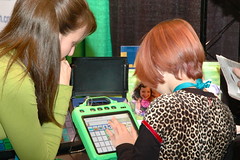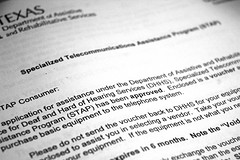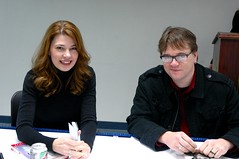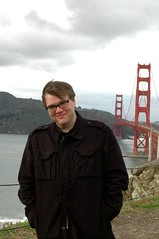
(Photo by Shannon Sakmary-Best)
So yes, it turns out that 2500 people is, well, a lot of people.
I got a sense of that fact when we went to the sound check the day before the Keynote Session of the 2009 Texas Speech Language Hearing Association Convention. We were looking for Ballroom D, but when we peeked in the door to Ballroom G, we saw that I would in fact be speaking in Ballroom All-Of-Them. The partitioning walls had been retracted and the entire room was open. Three giant screens loomed over the stage, two of which would display my slide presentation (mostly photos of Schuyler, because I'm no dummy) and one which would show my head all giant-sized as I spoke. When we showed up the next morning, the room was full and some people had even been turned away. It feels surreal even to say that, but there it is.
I'm happy to report that the speech went well, I believe. I got a great deal of positive feedback from people afterwards, and no one booed or threw any of their breakfast tacos at me. The book signing sessions immediately following were crowded and friendly, with Schuyler signing in pink and generally charming everyone. (Again, I'm no dummy; I understood who people were there to meet.) I spoke to a local public radio reporter without sounding too idiotic, and we even visited the state capitol building to meet the governor (who was a no-show, sadly; I wanted to see Schuyler give Rick Perry one of her tackle-hugs) and other representatives about some upcoming bills that are of great interest to speech language pathologists and their patients.
Everywhere we went for the next two days, people would come up to us and say that they cried or were inspired by the speech, and I can't even begin to tell you how much that means to me. It's a powerful thing for me to hear because the fact is that we're not that different from any other parents out there who have fought and will continue to fight for our disabled kids. If we're different at all, it's because 1) the book has given us a voice where so many parents have none, and 2) Schuyler's story has a very rare happy ending, or at least a happy beginning. As a result, the idea that I could represent other parents is a humbling one, and one that I take very seriously.
The Texas Speech Language Hearing Association is made up primarily of SLPs (speech language pathologists, if you're not into the whole brevity thing). They represent one leg of the crucial balance for kids with disabilities who attend public schools, with teachers and parents making up the other supports. It's a wobbly tripod under the best of circumstances. I acknowledged in my speech that the two biggest obstacles for SLPs as they attempt to implement therapies and technologies are teachers and parents.
Teachers are overwhelmed by their class loads and by the labyrinthine system put in place by school boards and state-mandated testing and No Child Left Behind, and can be resistant to new technologies and therapeutic approaches. Much of the time they're just getting used to the last Big New Thing that came at them. And parents often feel overmatched by the capital-E Experts they face when they go in for their kid's IEP meeting. Until they take up the fight, educate themselves and become empowered, special needs parents serve as a kind of wind drag on the process, which is unfortunate and even frustrating, because we should be leading the fight, not following hesitantly behind.
Part of why I wanted to deliver this speech was to make the case that when empowered, special needs parents become a powerful force for change and progress. "No one is a quicker study," I said, "than the special needs parent." Julie and I couldn't help Schuyler much; we weren't qualified or trained to do so in a meaningful way. But without our persistence and our self-education and our willingness to be a pain in the ass when it was necessary, Schuyler wouldn't have been helped. She wouldn't have had the opportunity to become who she is today, and who she's going to be tomorrow, or in ten years.
And that's not because we're such swell parents and should be lauded for our efforts. It's because that's our job. And if you're a parent of a special needs kid? It's your job, too. If your kid gets into the finest program in the country, or if they end up in some awful place where they get parked in the corner and are simply fed and watered like a plant until they turn seventeen, the fact remains that eventually, they won't be anyone's responsibility but your own.
And when the school can look up at your kid, shrug and say "Not my problem", you as a parent had better not be standing there thinking that it's time for you to get involved. Because by then, it'll be too late. You will have squandered your opportunity to save your child, and you will get to take over the feeding and watering and regretting the wasted years.
-----
To the SLPs represented at the TSHA conference, I said this:
What does the future hold for kids like Schuyler? I wish I knew. There are so many kids out there like Schuyler, so many stories, many of them sad and most of them overwhelming, and yet the one thing that I truly believe these kids have in common is that none of their future stories is written. I watched Schuyler defy the expectations of her earliest teachers and doctors, and I've learned to trust in our ability to be a pain in the ass on her behalf. Her support in Plano has been so solid and so consistent that there are times when I forget, for just a moment, how many times she could have been left behind, in general special education classes where she wasn't taught so much as cared for. I forget the devil of low expectations so often assigned to her, and how hard we had to fight to throw those expectations off. If Schuyler has flown as high as she has despite the limitations that were consistently placed on her, can you imagine how far she and all her fellow students might go if, from the very beginning, they could be given an environment that focused not on what they can't do, but on what might be possible? Can you imagine that world where parent/teacher meetings didn't consist of "Here's why we can't try that" but instead simply "Why not?"
As parents of broken kids yearning for repair or compensatory development, we go into battle against our children's monsters clutching whatever weapons we can find. Rubber swords if necessary, nothing but our hands if need be. If we seem desperate at times, it's because we are, we are absolutely desperate, and you'll find that most of us will do whatever it takes to defeat those monsters, or to muzzle them, tame them, to put them on leashes and just manage them. We just don't want to do it alone. We need you. As educators and SLPs, voters and taxpayers, as fellow citizens of the world and children of God, you can be our heroes. We're desperate for heroes most of all. All of you can be the ones who step up beside us and say "Here's a real sword, let's take care of this."
-----
It was an honor and a privilege to speak to so many people, particularly ones who work so hard to help Schuyler and her friends. I would also humbly suggest that it is THEIR honor and privilege, as it is mine, to work with kids like Schuyler. The work is hard. The rewards are immeasurable, and go all the way down to the soul.

Before the speech

The line at the book signing

Signing books with Schuyler and her pink pen

Schuyler signing the governor's guest registry

Schuyler with PRC's Tracy Custer

(Photo by Shannon Sakmary-Best)























